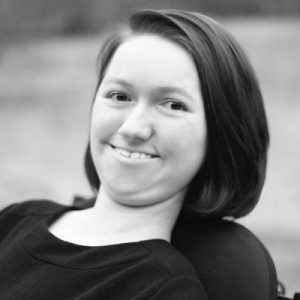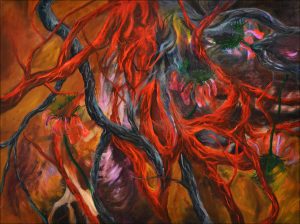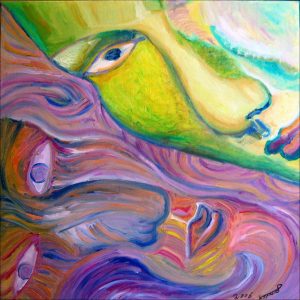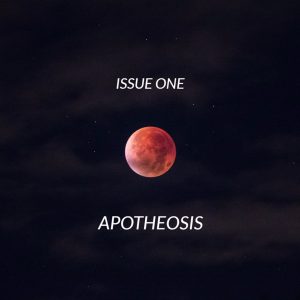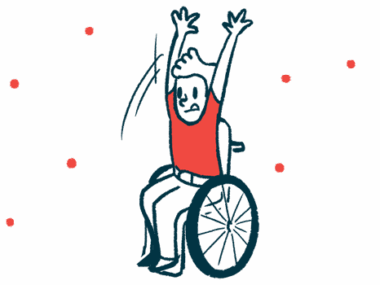Columnist Brianna Albers Launches ‘Monstering,’ Literary Zine for Those Often Seen as Curiosities
Written by |
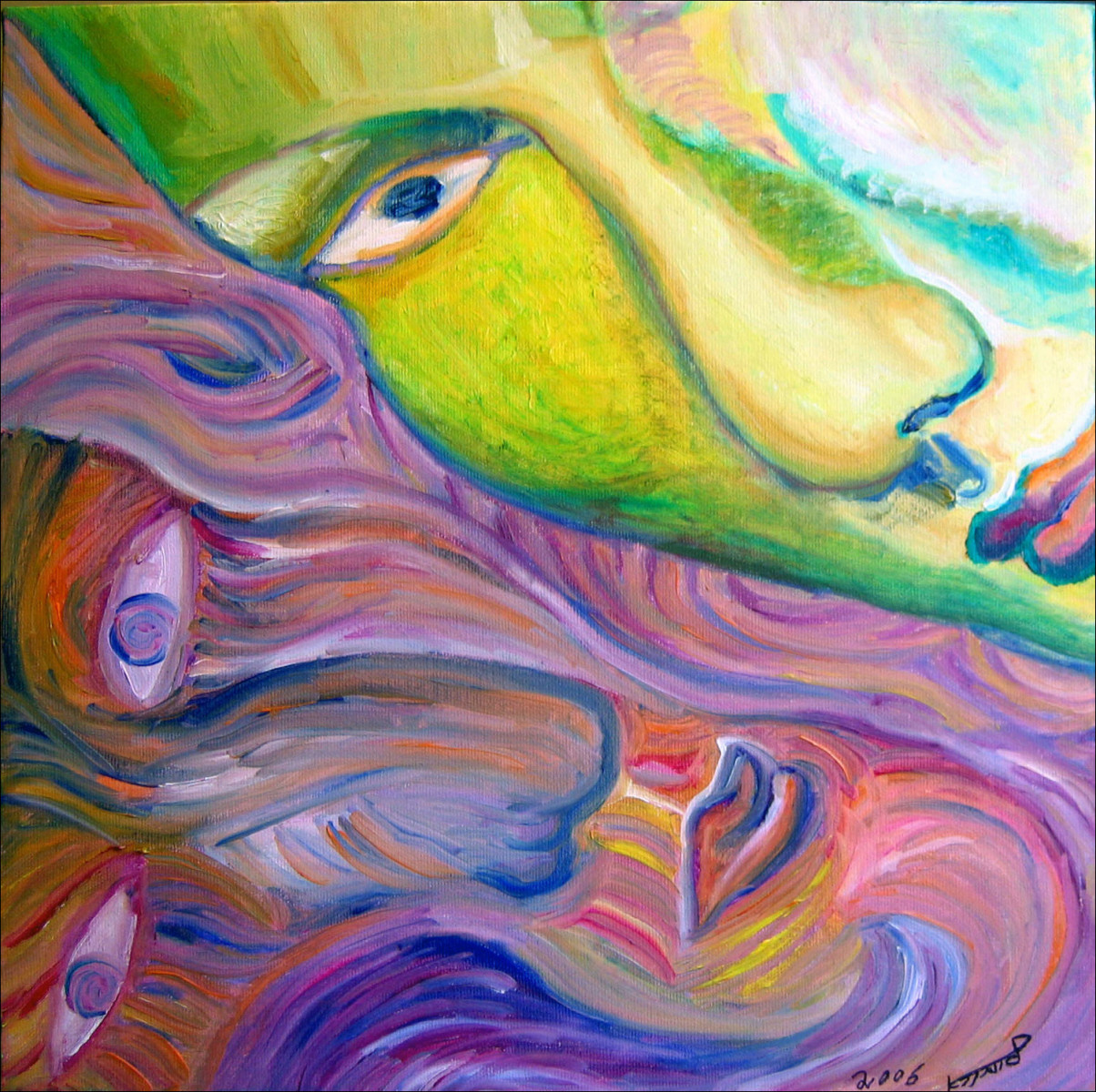
"A reflection" by Israeli artist Limor Ashkenazy appears in the inaugural issue of Monstering.
At nine months of age, Brianna Albers was diagnosed with spinal muscular atrophy (SMA) type 2. As a 22-year-old college senior from Rosemount, Minnesota, she also struggles with social anxiety, dysthymia (mild depression), and disordered sleep.
In society’s view, she says, that makes her a bit of a monster.
“Disabled people have often been seen as monsters throughout history. Eugenics, for example, tried to eradicate all disabled people for fear of our genes polluting the rest of the human population,” said Albers, a columnist for SMA News Today since March 2017.
“But I also see this in other, smaller things. A lot of people stare at my wheelchair when I’m out in public, and while I know a lot of it is curiosity, there are some people who genuinely do not like me, or think that my disability somehow makes me ‘less than.’”
This is the same rhetoric that dogged Frankenstein, with the monster being pitied or feared.
Turning the insult on its head, Albers decided to start an online literary zine for “disabled women and nonbinary people” that she calls “Monstering.”
Albers got the idea for a zine — an online magazine, usually devoted to specialized and often unconventional subjects — from a friend who had started one.
“I’d been on staff at different literary magazines for years at that point, but had yet to find a publication that felt like it was for me,” she said in an interview by email. “I wanted a little space on the internet that I could call my own as a disabled woman, and I wanted other people to feel like they belonged as well.”
The zine’s mission statement says it is geared toward disabled women and “nonbinary people.” The term describes individuals who don’t feel completely male or female — or those who feel their gender identity is something different altogether.
Within a few months Albers had assembled a team of writers, poets, artists and musicians. For now, she covers most of the costs of “Monstering,” including a monthly website maintenance fee. She also pays contributors $10 per submission.
Albers posted her first issue a few weeks ago, along with this editor’s note: “I didn’t expect many people to be interested in a magazine for disabled women and nonbinary people. Perhaps this was a failing on my part — I didn’t realize how large the community is, or how large my world would become as a result of reaching out. Yet here we are, a year after our launch, bigger and better and brighter — so much brighter — than I could have imagined, even in my wildest dreams.”
This first issue contains 37 entries covering a variety of topics and genres. The fare ranges from an interview with Berlin-based writer and musician Johanna Hedva; a poem, “Numb is a Feeling: Embodying a Body of Pain,” by Jennie Duguay; and an artistic rendering of physical trauma in Inés Ixierda’s “Glamour Shot/Fasciotomy self-portrait.”
Also included are paintings by Joy Xie, a New Jersey writer and artist, and by Limor Ashkenazy, a wheelchair-bound Israeli woman with Morquio syndrome, a rare metabolic disorder.
“We’re hoping to put out content every year or so, but we also update our blog regularly as well,” Albers said. “Our contributors self-identity as disabled, but we don’t require them to disclose their conditions.”
Because of her SMA, doctors didn’t expect Albers to survive beyond her ninth year. She defied them all, and went on to excel at Rosemount High School, graduating with a 3.9 grade point average — even though she couldn’t physically attend classes during Minnesota’s harsh winters because she gets sick easily.
In her spare time during high school, Albers worked on the school paper — the “Irish Gazette” — wrote a science fiction novel, and as a junior, won a Yale Book Award. The award honors outstanding high school juniors every year, giving the books to the students themselves or their schools.
Albers started her studies at the University of Wisconsin at Milwaukee as an English literature and writing major, but as a sophomore switched to psychology. She’s on track to earn her bachelor’s in December.
“Since my schoolwork is all online, I don’t deal with the physical exhaustion that was so familiar to me before I transferred to UWM,” she said. “I was originally at Bethel University in St. Paul, and was driving around two hours every day. I no longer waste the small reserves of energy I do have on things that aren’t important, and save them for trips with my parents and hanging out with friends.”
She hopes to start an online master’s program in clinical mental health counseling at Indiana Wesleyan University next year.
“That being said, writing — creative and journalistic — is still a big part of my life, and it’s ultimately what I want to do career-wise,” Albers said, acknowledging the limitations that spinal muscular atrophy, a rare muscle-wasting disorder, would place on that career.
“SMA is a progressive disease, and I do get tired out after a long day’s work,” she said. “The week or so leading up to the release of the issue was a tough one for me, because I was essentially working nine- to 12-hour days. I was wiped, and it really started to take a toll on my physical and mental health, so for me it’s a lot about balance.”
Occasionally, she turns down extra writing assignments to stay balanced.
“I’ve had to figure out what my boundaries are, and then of course forgive myself for the things I’ve had to let go of,” Albers said. But for now, nothing is more important than getting her zine off the ground. She’s already working on the next issue, even though it won’t be out until 2018.
“‘Monstering’ is our way of pushing back against this idea that disability equals bad,” she said. “Obviously, living with a disability isn’t easy, but we also want to recognize that we are whole in our illness. We don’t necessarily need to be fixed or cured in order to join society. Our disabilities have made us strong and resilient, and ‘Monstering’ allows us to celebrate that.”
